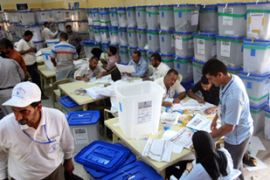Al-Maliki ahead in race for Baghdad
Preliminary results show Iraq PM’s election list with a wide lead in Iraqi capital.

The Iraqi capital accounts for 70 parliamentary seats, or more than a fifth of Iraq’s 325-member Council of Representatives.
Close race
Partial results also indicate that al-Maliki’s election list is leading in Najaf, Babil Muthanna and Karbala provinces, while Allawi’s Iraqiya alliance tops the list in two provinces north and east of Baghdad.
“Allawi is in the lead in Diyala and Salaheddin,” Iyad al-Kinaani, an official at Iraq’s Independent High Electoral Commission (IHEC), said
| special report |
 |
“In Diyala, he is followed by the INA and al-Maliki. In Salaheddin, Allawi is followed by [Interior Minister Jawad] Bolani and then al-Maliki.”
Bolani is at the head of the Iraqi Unity Alliance, a cross-sectarian secular coalition.
In northern Iraq, a list representing Iraq’s two major Kurdish parties is apparently far ahead of a reform-minded challenger, according to partial early results.
Twenty eight per cent of votes counted showed the bloc including the Patriotic Union of Kurdistan of Jalal Talbani, the Iraqi president, and the Kurdistan Democratic Party of Masoud Barazani, the regional president of Iraqi Kurdistan, are far ahead of the Goran Party, which is running on a reform platform.
Full results are not expected to come through until March 18 and the final ones, after any appeals are dealt with, will be announced at the end of the month.
“One of the reasons for this is that all the ballots are being counted in major centres in the provinces,” Mike Hanna, Al Jazeera’s correspondent in Baghdad, said.
“What comes to Baghdad are tabulated results which are then painstakingly entered into a computer database, and it’s from this that the provisional results are being released.
“There is a creeping impatience among the Iraqi people. The election commission is saying it is moving as quickly as possible, and is still calling on blocs and parties not to make any predictions about the vote until there are enough counted to give some kind of formal trend.”
No clear majority
A clear victory by any of the blocs is unlikely and negotiations to form a coalition government could take months, leaving the possibility of a dangerous political vacuum.
Sixty-two per cent of Iraq’s nearly 19 million voters turned out at the polls, held on March 7, despite death threats from the al-Qaeda-linked Islamic State of Iraq. A spate of election-day attacks left 39 people dead.
Al-Maliki’s State of Law was the big winner in the January 2009 provincial elections and campaigned on a platform of improved security and strong central government.
Ad Melkert, the UN special representative to Iraq, lauded the vote count on Wednesday as an “honest process” and urged candidates and parties to accept the results.
The results are anxiously awaited by foreign oil companies making plans to invest billions of dollars in Iraq and by Washington policymakers as the US prepares to formally end combat operations by the end of August and leave the country before 2012.